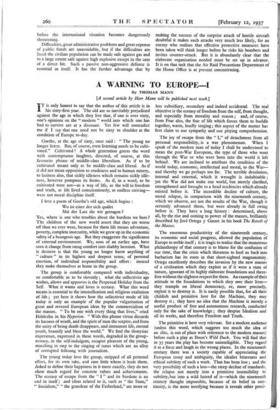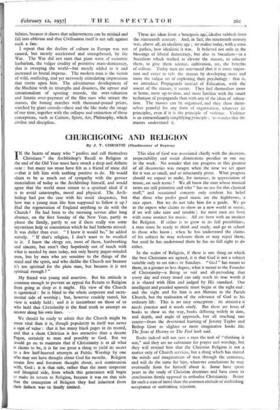A WARNING TO EUROPE -I
By THOMAS MANN
[A second article by Herr Mann will be published next week.] IT is only honest to say that the author of this article is in his sixty-first year. The old are so inevitably prejudiced against the age in which they live that, if one is over sixty, one's opinions on the " modern " world into which one has had to survive are at a discount. Yet few will contradict me if I say that one need not be sixty to shudder at the condition of Europe to-day.
Goethe, at the age of sixty, once said : " The young no longer listen. But, of course, even listening needs to be culti- vated." Cultivated ! A whole generation greets the word with contemptuous laughter, directed, of course, at this favourite phrase of middle-class liberalism. As if to be cultivated meant only to be middle-class and liberal. As if it did not mean opposition to crudeness and to human misery, to laziness also, that sickly idleness which remains sickly idle- ness, however pompous its forms. As if, in a word, to be cultivated were not—as a way of life, as the will to freedom and truth, as life lived conscientiously, as endless striving— were not moral discipline itself.
I love a poem of Goethe's old age, which begins : Wo ist einer der sich qualet Mit der Last die wir getragen Yes, where is one who troubles about the burdens we bore? The children of the new world assert that they are worse off than we ever were, because for them life means adventure, poverty, complete insecurity, while we grew up in the economic safety of a bourgeois age. But they exaggerate the significance of external environment. We, sons of an earlier age, have seen it change from smug comfort into shabby heroism. What is decisive is that the young no longer know anything of " culture " in its highest and deepest sense, of personal exertion, of individual responsibility and effort : instead they make themselves at home in the group.
The group is comfortable compared with individuality, so comfortable as to be slovenly ; what the collectivist age wishes, allows and approves is the Perpetual Holiday from the Self. What it wants and loves is ecstasy. What this word means is essential to the intensification and religious exaltation of life ; yet here it shows how the collectivist mode of life today is only an example of the popular vulgarisation of great and revered European ideas by the commercialism of the masses. " To be one with every thing that lives," cried Holderlin in his Hyperion. " With this phrase virtue discards its harness of wrath, and the spirit of man the sceptre, and from the unity of being death disappears, and immanent life, eternal youth, beautify and bless the world." We find the dionysiac experience, expressed in these words, degraded in the group- ecstasy, in the self-indulgent, escapist pleasure of the young, marching in step to the singing of tunes which are an alloy of corrupted folksong with journalism.
The young today love the group, stripped of all personal effort, for its own sake, and care little where it leads them. Asked to define their happiness in it more exactly, they do not show much regard for concrete values and achievements. The ecstasy of escape from the " I " and its burdens is an end in itself; and ideas related to it, such as " the State," " Socialism," " the grandeur of the Fatherland," are more or less subsidiary, secondary and indeed accidental. The real objective is the ecstasy of freedom from the self, from thought, and especially from morality and reason ; and, of course, from Fear also, the fear of life which forces them to huddle together, warm, loudly singing; this aspect of the matter has first claim to our sympathy and our pitying comprehension.
The joy of escape from the " I," of detachment from all personal responsibility, is a war phenomenon. When I speak of the modern man of today I shall be understood to mean the post-War European, the type of those who went through the War or who were born into the world it left behind. We are inclined to attribute the condition of the world today, economic, intellectual and moral, to the War— and thereby we go perhaps too far. The terrible desolation, internal and external, which it wrought is indubitable ; yet the War did not make our world, but merely clarified, strengthened and brought to a head tendencies which already existed before it. The incredible decline of culture, the moral relapse, in comparison with the nineteenth century, which we observe, are not the results of the War, though it certainly advanced them, but were already in full swing before it. They have a long history : determined, above all, by the rise and coming to power of the masses, brilliantly described by Jose Ortega y Gasset in his book The Revolt of the Masses.
The enormous productivity of the nineteenth century, its economic and social progress, allowed the population of Europe to treble itself; it is tragic to realise that the monstrous philanthropy of that century is to blame for the confusion of our time, that the crisis which threatens to hurl us back into barbarism has its roots in that short-sighted magnanimity. Ortega excellently describes the invasion by the new masses of a civilisation which they exploit as if it were a state of nature, ignorant of its highly elaborate foundations and there- fore without the slightest respect for them. An example of their attitude to the foundations to which they owe their lives— they trample on liberal democracy, or; more precisely, exploit it to destroy it. It is easily possible that, for all their childish and primitive love for the Machine, they may destroy it ; they have no idea that the Machine is merely a useful product of free and autonomous research, conducted only for the sake of knowledge ; they despise Idealism and all its works, and therefore Freedom and Truth.
The primitive is here very relevant. Set a modern audience (unless this word, which suggests too much the idea of an elite, is out of place with reference to the modern masses) before such a play as Ibsen's Wild Duck. You will find that in 35 years the play has become unintelligible. They regard it as a farce and laugh in the wrong places. In the nineteenth century there was a society capable of appreciating the European irony and ambiguity, the idealist bitterness and ethical subtlety of such a work. That has been lost ; and the very possibility of such a loss—the steep decline of standards, the relapse not merely into a primitive insensibility to subtlety, but into a wild hatred of it—which the nineteenth century thought impossible, because of its belief in con- tinuity, is the more terrifying because it reveals other possi- bilities, because it shows that achievements can be mislaid and fall into oblivion and that Civilisation itself is not safe against such a.-fate.
I repeat that the decline of culture in Europe was not caused, but merely accelerated and strengthened, by the War.- The War did not start that giant wave of eccentric barbarism, the vulgar crudity of primitive mass-democracy, that is sweeping - the world—but merely added to it and increased its brutal impetus. The modem man is the victim of wild, confusing, and yet nervously stimulating impressions that storm upon him. The adventurous development of the Machine with its triumphs and disasters, the uproar and sensationalism of sporting records, the over-valuation and lunatic over-payment of the film stars who attract the masses, the boxing matches with thousand-pound prizes, watched by giant crowds—these and the like make the image of our time, together with the collapse and extinction of those conceptions, such as Culture, Spirit, Art, Philosophy, which civilise and discipline. These are ideas from a bourgeois age; idealist rubbish from the nineteenth century. And, in fact, the nineteenth century was, above all, an idealistic age ; we realise today, with a sense of pathos, how idealistic it was. It believed not only in the blessings of liberal democracy, but also in Socialism—in a Socialism which wished to elevate the masses, to educate them, to give them science, cultivation, art, the benefits of culture. Today men are convinced that it is more impor- tant and easier to rule the masses by developing more and more the vulgar art of exploiting their psychology : that is, we introduce Propaganda instead of Education, with the assent of the masses, it seems. They feel themselves more at home, more up-to-date, and more familiar with the smart technique of propaganda than with any of the ideas of educa- tion. The masses can be organised, and they show them- selves grateful for any form of organisation, whatever its principles, even if it is the principle of violence. Violence is an extraordinarily simplifying principle ; no wonder that the masses understand it.















































 Previous page
Previous page